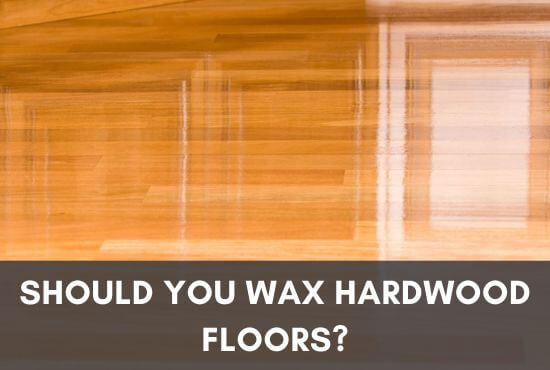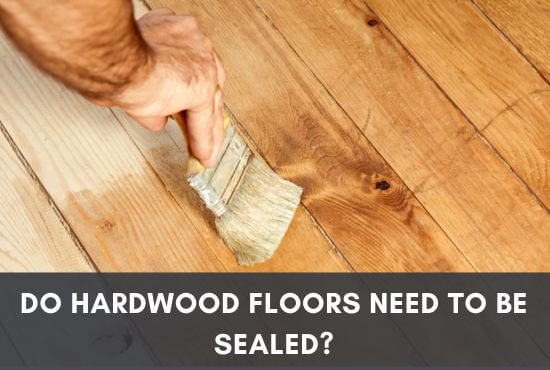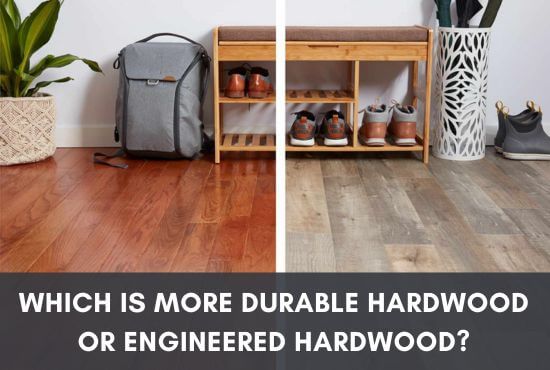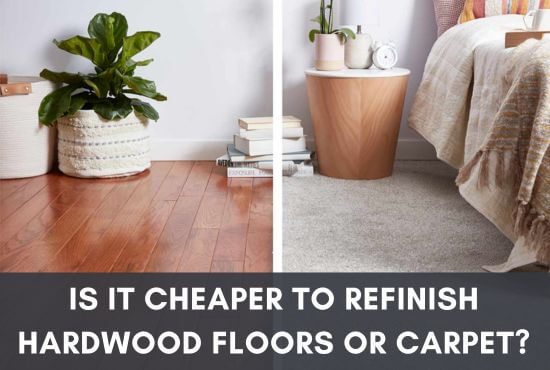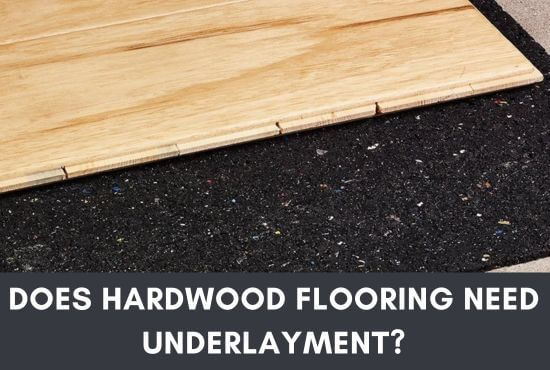Engineered wood floors are one of the most popular in the category of wooden flooring for both commercial and domestic use.
They are a beautiful way of adding value to your house and making it appear more beautiful. However, many people have claimed that the engineered wooden floors get scratched easily which is why they should not be bought.
While others claim it to be a false statement and show proof of how their engineered wood flooring does not scratch easily till date. Whether this is true or not, let us find out today.
Engineered wood flooring, when finished, is highly resistant to scratches. However, if the flooring is unfinished, its surface can be scratched like any other unfinished wood. The choice between finished and unfinished surfaces is subjective, but considering scratch resistance is essential.
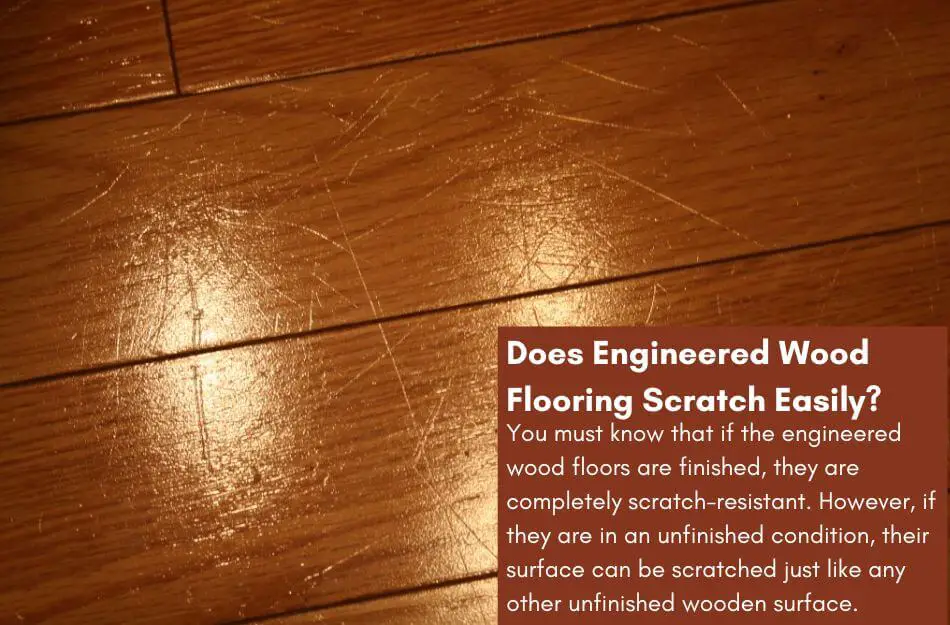
However, there are many other aspects to this topic which are worth noticing and there are ways to make the unfinished floors scratch resistant which are mentioned later on.
So, make sure to check those out as you read the article till the end.
Table of Contents
- 1 What Are Engineered Hardwood Floors?
- 2 Does Engineered Wood Flooring Scratch Easily?
- 3 Finished or Unfinished Engineered Wood?
- 4 How To Make Engineered Wood Flooring Scratch-Resistant?
- 5 Hardwood Or Engineered Hardwood?
- 6 What Wood Floor Is Most Scratch Resistant?
- 7 What Are The Disadvantages Of Engineered Wood Flooring?
- 8 Is Engineered Wood Flooring Durable?
- 9 Takeaway
What Are Engineered Hardwood Floors?
Engineered wood is a sub-type of hardwood, a synthetic material that combines wood and other composite materials such as PVC and plastic.
Engineered hardwood allows you versatility and variety in colors and designs for your home while offering additional durability and strength.
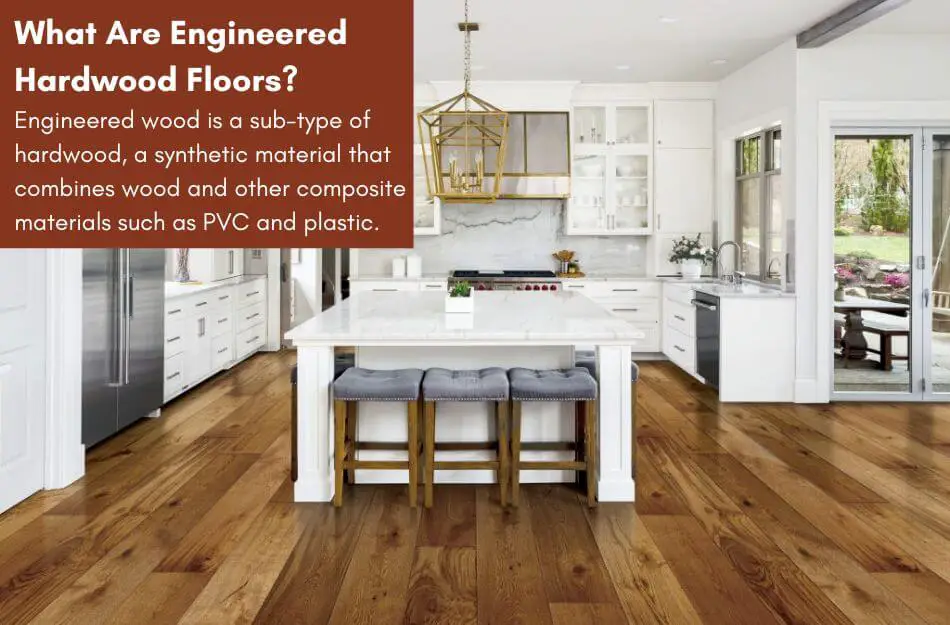
Though it is made of real wood, it also comprises other composite materials such as veneer, vinyl, etc., making it even more robust.
While the core is made of plywood or hardwood, the top is usually layered with veneer for further protection and resistance against wear and tear.
Hence, it is more durable, strong, and has higher longevity than many other flooring solutions.
Does Engineered Wood Flooring Scratch Easily?
If the engineered hardwood is finished, it will not get scratched easily; however, if the wood is unfinished, it is as prone to scratches as any other type of wooden flooring. Besides, if the engineered wood is unfinished, chances are it can easily give in to moisture and water damage despite its veneer coating and other supposed qualities.
Wood is not a very robust material and needs to be finished to bear the amount of wear and tear it gets from daily usage.
If you don’t finish it, you can easily expect markings, scratches, scuff marks, and even scars if heavy objects are dragged on the floors.
It is possible to buy unfinished engineered wood floors from the market; however, they should be left untreated as it exposes them to many types of dangers. Hence, treating and finishing your hardwood floors as soon as possible is only wise.
Finished or Unfinished Engineered Wood?
Choosing between finished and unfinished engineered wood depends on personal preferences. Unfinished wood allows for customization and the application of a protective layer. On the other hand, finished wood provides immediate protection, minimizing wear and tear on the floors from the beginning.
Many homeowners think the unfinished engineered hardwood floors are meant to be kept and used in their original state, but reality begs to differ.
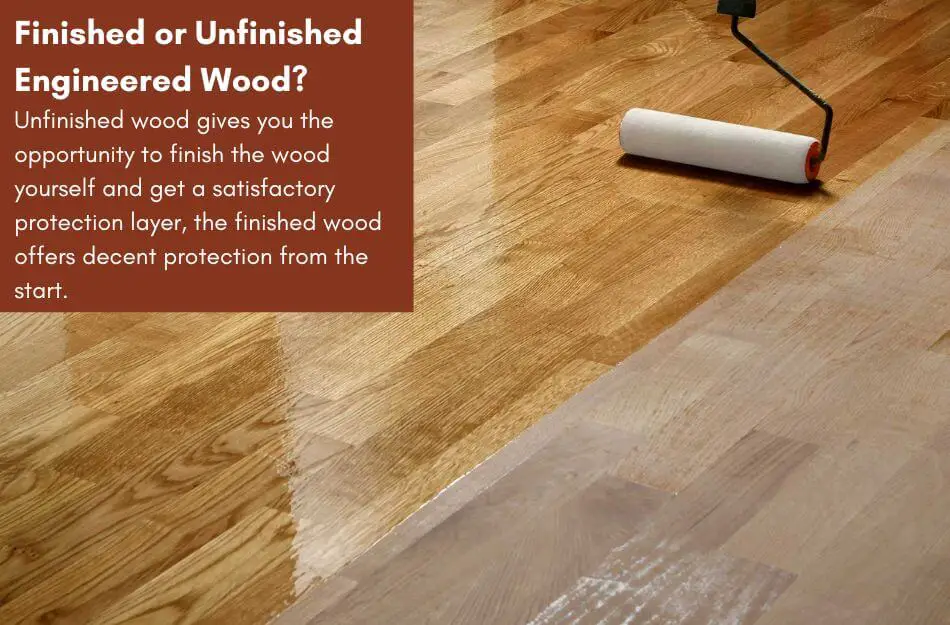
The main purpose of these unfinished wooden floors is to allow you to coat them with your desired finish and treat them with the chemicals you choose so they can best serve the purpose it is being used for.
Whether you want to use lacquer or oil, an unfinished wooden floor will allow you to do so. On the other hand, a finished floor does not allow penetration at all and is hence impossible to coat with your desired materials.
Although this task is quite difficult and expensive if you hire a professional to perform it, many homeowners prefer doing this by themselves to ensure that they have reasonable protection on their floors, which will help the floors sustain their longevity and maintain their longevity and rich luster.
However, the vast majority of engineered wood floors contain a factory finish which allows it to provide protection to the floors and the wooden surface from the start and makes it eligible to resist dangers such as scratches, infestations, moisture damage, and more.
Besides, they are not only finished but also treated with various chemicals, which makes them resistant to decaying, rotting, and other deteriorating factors, increasing their durability and longevity in the long run.
While both of these are suitable for your house, you can choose either according to the price differences between the both.
Unfinished engineered wood is cheaper, but you must pay for the finishing process apart from the material cost.
Whereas the finished engineered wood is quite expensive, you don’t have to pay anything other than installation charges for the floors.
But there is another important factor to keep in mind while making this decision. Finished hardwood floors feature a factory finish, but the problem is that the finish layer is quite thin and will wear off after some time.
This would require you to get the floors refinished again, and you will have to pay a considerable amount of money depending on the type of finish you want and the labor charges in your area.
Hence, many homeowners prefer to switch to unfinished hardwood floors and get them finished, as it is a much more reliable and lasting solution.
In short, we can say that finished engineered wooden floors are a short-term solution and best suited if you want to sell or rent out the property.
At the same time, unfinished wooden floors with a different finish are a long-term solution and best suited if you want to use the floors yourselves.
Besides, finished floors will benefit you by being scratch-resistant from the first day, which unfinished floors can’t offer.
How To Make Engineered Wood Flooring Scratch-Resistant?
To make engineered wood flooring scratch-resistant, you should seal or finish the floors promptly. This process provides a protective layer that enhances the durability of the wood and guards against scratches. This ensures the long-lasting and scratch-resistant performance of the flooring.
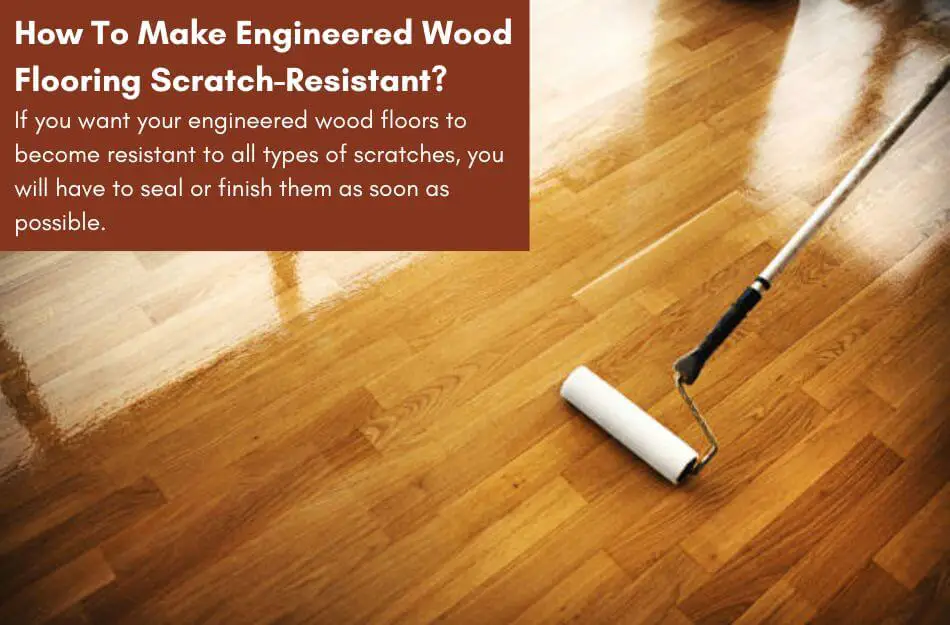
If you’ve bought unfinished engineered wood and have left it as it is without sealing it, you are not treating the wooden floor the way it deserves.
Unfinished hardwood floors can get scratched, cracked and receive serious damage from moisture content if the environment is too moist or if there are spillages or leakages.
Hence, it is necessary to ensure that the engineered wooden floors are given a protective treatment to keep them safe from all such damage.
Scratch-resistant Finishes
As we know, the surface of engineered wood flooring is quite similar to that of regular hardwood floors. While the veneer coating makes it slightly more moisture and water-resistant, engineered wood can’t bear scratches due to the thin build and less wood content.
This makes it as prone to scratches as any other type of wood. Hence, you must finish the engineered wood floors scratch-resistant to protect them from such dangers.
While you can choose from various finishes regardless of the type of wood you have installed in your flooring, it is best to stick to the two most popular.
The first is the oil finishes, and the second is the lacquer. Both are highly effective and practical, providing an optimum layer of protection to your engineered wood floors and preventing them from getting scratched or scuffed.
If you are confused between the two, let us explain. Both of these finishes are applied directly to the surface and do not require any mediation step, which makes them super-easy to apply.
Besides, the oil finishes are easy to apply and soak into the wood pores. This allows them to sit on the surface of the wood and keep the fibers healthy.
Besides, it locks in necessary moisture and forms a protective film on the top to protect the wooden floors.
Lastly, oil finishes are renowned for giving the wood a natural appearance and enhancing it even further, so if you don’t want a superior finish, an oil finish is the most subtle option.
On the other hand, Alternatively, lacquer is a thicker finish which offers more protection but also adds more sheen to the wood, looking slightly less natural.
While the lacquer may become scratched, it offers maximum protection for the wood beneath it. The finish can simply be reapplied to get rid of any scratches.
Wood Floor Polish
Although finishing is an important procedure to give your engineered wood floors a primary coat of protection which will save them from scratch, you also have to take care of the floors and maintain them regularly to keep them healthy and maintain their pristine condition.
Just like carpets and rugs need to be deep cleaned once a year and all surfaces require a good cleaning session, the wood floors must be treated similarly.
Wood polishes are among the best methods of keeping your engineered wooden floors in the healthiest condition. They are an optimum way to maintain oil and lacquer-finished engineered wood floors.
They lock in necessary moisture and restore the floor color from areas which have faded or darkened due to excessive traffic.
Hence, it is very useful to polish your wooden floors so that the wooden surface and the finish are kept in the best health.
Moreover, it is the optimum way of maintaining the scratch-resistant properties of your hardwood floors. It even renews the finish and makes it appear more rich and fuller.
A suitable time frame for polishing your wooden floors is every 18 months. However, if your floors receive extra traffic or a certain area receives excessive traffic, it is wise to polish or more frequently.
Hardwood Or Engineered Hardwood?
Hardwood is certainly more durable than engineered wood. Due to its thicker surface and ability to be restored and refinished occasionally, it can receive much more traffic and pressure than thin, composite-engineered wood.
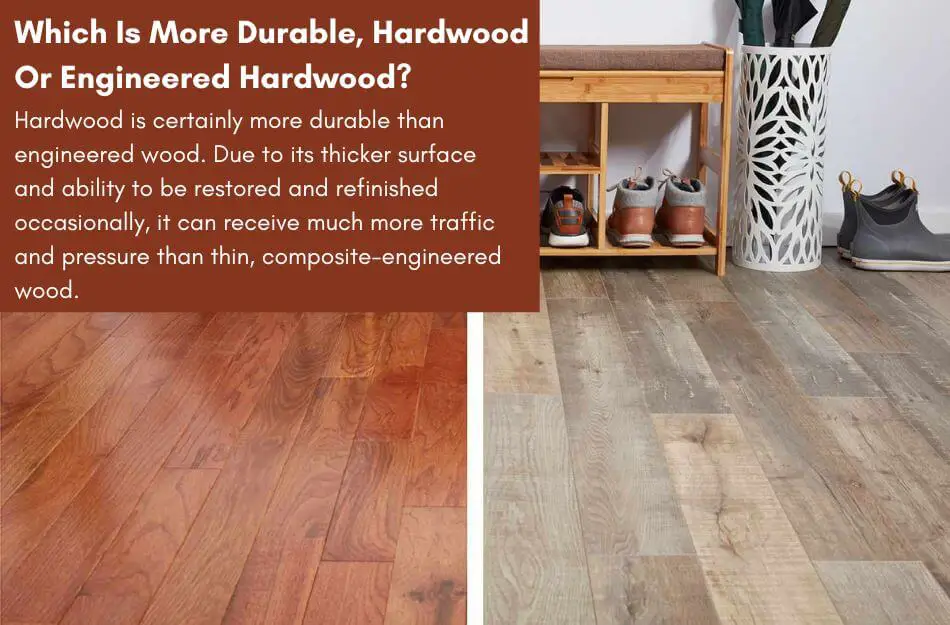
While many debate the features of engineered hardwood floors for being resistant to moisture, rotting, and decay, these attributes are naturally found in the higher grades of hardwood.
Besides, solid hardwood floors can improve in all these areas once they are coated with durable sealant or finish.
Hence, we can easily deduce from the discussion above that hardwood floors are more durable than engineered wood.
What Wood Floor Is Most Scratch Resistant?
Oak is considered the most durable type of wood flooring which can resist scratches, moisture damage, rotting, decaying, and other factors which can ruin wood.
Oak is one of the oldest and most commonly used types of wood in hardwood floorings and is renowned to be highly durable and robust.
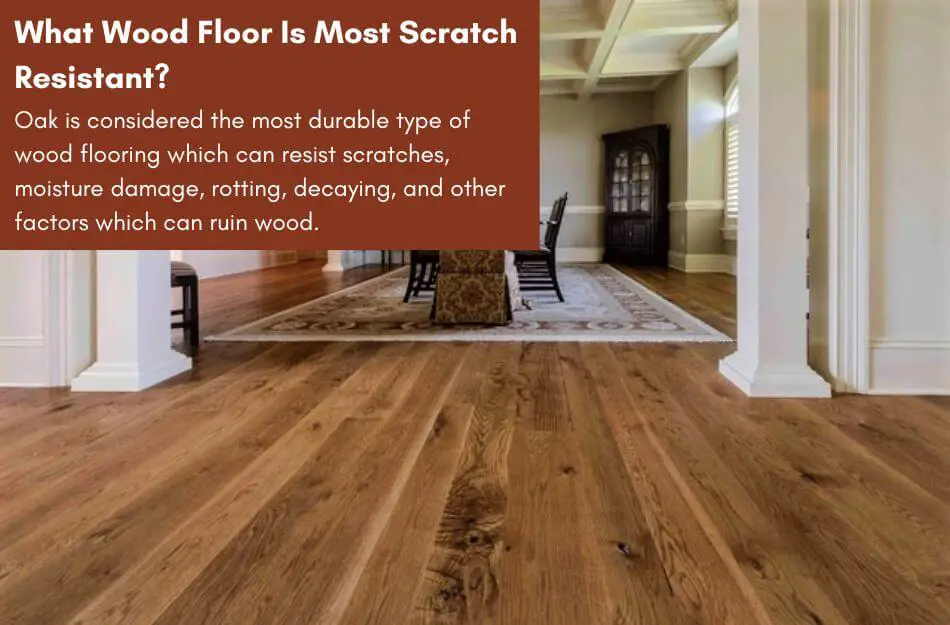
It has a lifespan of up to 100 years and requires only menial maintenance from time to time to sustain its fresh and new appearance.
Besides, oak is affordable and can be customized according to your preferences. It is one of the best receivers of wood stains and absorbs them very smoothly to give your hardwood floors the look you want them to have.
The texture of oak allows it to resist scratches to a high extent which makes it a suitable option for areas with higher traffic.
Furthermore, paired up with a suitable finish, it can be extremely durable and perhaps the most reliable option for your flooring requirements.
What Are The Disadvantages Of Engineered Wood Flooring?
The greatest disadvantage of engineered wood is its inability to be restored.
The thin surface and the veneer coating on top make it almost impossible to sand and re-seal the wood. This decreases the lifespan of engineered wood which is another of its downsides.
Besides, engineered hardwood’s lack of variety and colors decreases its popularity among the flooring community.
Is Engineered Wood Flooring Durable?
Engineered wood is very durable due to its composition of veneer and PVC combined with hardwood. It is a robust material which is highly suitable for your flooring requirements.
However, it is not as durable as solid hardwood floors and is hence, considered to be second in line of superiority in the wood flooring industry.
Takeaway
Engineered wood is a strong and reliable solution for your flooring which can last you a reasonable amount of time and can increase your property’s value by a considerable ratio.
As far as scratching is concerned, no wood type is strong or resilient enough to deny scratching completely without the help of a varnish layer. The same is the case with engineered wooden floors.
Hence, if you are looking forward to installing wooden floors in your house, please do not hold back on engineered wood just because you think it is not resistant to scratches.
The unfinished versions can be finished with a stronger and better protective coat. Besides, if you are so considerate about it, you can get finished engineered wood which is totally resistant to scratches and other such dangers.
Therefore, you must choose engineered hardwood floors for your house and get them finished for optimum protection against all kinds of dangers.
John Henry is a passionate co-creator of FlooringFlow.com. a website dedicated to answer all of your flooring related questions. After taking the challenges of flooring DIYs while learning skills for years, John is now ready to share his knowledge related to floor remodeling and projects with you.

![70 Bedroom Color Schemes: [year] Home Bedroom Refresh 70 Bedroom Color Schemes: [year] Home Bedroom Refresh](https://flooringflow.com/wp-content/uploads/2024/07/25-Cool-4th-of-July-Decorations-for-Outdoor-Patio-to-Celebrate-in-Style-16.jpg)
